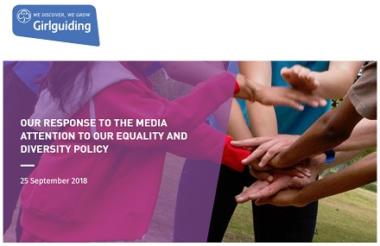Getting into an argument with a national newspaper, the saying goes, is like wrestling with a pig. You both get dirty, but the pig likes it.
This is a growing problem for charities, as we all know. The papers suddenly discovered charities about five years ago. Now we’ve all grown accustomed to seeing front page splashes which attack the sector’s actions, on any number of fronts.
The question is how you respond. Is it worth getting into that fight with a pig?
Sometimes, no. In at least two cases, I think it’s fair to say, the papers have had a point, and charities have rightly backed away and apologised.
But on many other occasions the papers have been fishing, and their evidence has been weak. For a long time, it was frustrating to look at how weak the sector was at handling this sort of criticism, but recently, we’re seeing much stronger, clearer, more effective responses. Charities are realising that they have no choice but to fight back.
Girlguiding's approach to transgender individuals
Last week it was the turn of Girlguiding, who have expelled two volunteers over their approach to transgender individuals. The Sunday Times and The Times ran stories which reported all the facts, but were clearly angled against the charity. One suggested that the charity is being too hard on those who say trans people pose a safeguarding risk. Another suggested it was too hard on girls who transition into becoming boys.
I actually feel it’s reasonable to report these issues; we did so ourselves. It’s a matter of public interest and public debate whether self-identification is sufficient to allow a man or boy into a space normally reserved for women. And to me, it’s of interest if a charity’s members and volunteers disagree with its position.
But all told, Girlguiding has the high ground here. It asked its members what they thought its policy should be, and 86 per cent backed a particular course of action. The charity followed that course, and seems to be in tune with the mood of the country.
The charity’s first reaction was quite a bland, neutral statement, but after a couple of days, it came out swinging and issued a long, impassioned refutation, which it distributed widely to its supporters and stakeholders.
Girlguiding was following in steps of RNLI which, criticised over its decision to remove volunteer lifeboatmen for bullying, also launched a strong defence. And the Dogs Trust, criticised by the Mirror over its approach to puppy farming, also pushed back.
One thing which came through strongly in all of the recent responses was that the charities really believed they had acted with probity and integrity. That’s invaluable. I think the public want to see this more than anything. So long as the charities and the people who work there believe passionately that they’re doing the right thing, then so long as there’s two sides to the story, the charity is likely to be believed.
These charities also spoke clearly to their own audiences, which is important. You’re never going to get a fair hearing in the Daily Mail. You might as well accept that. You might as well use your response to question the process and point out that the article is one-sided. Then use the power of your own considerable audience of supporters, on social media and elsewhere, to come out swinging. The power of Twitter and Facebook is such that you don’t need the papers nearly as much as you did.
At worst, you’ll reach your own people. At best, you might find it gets picked up by the BBC.
'Their words were front and centre'
Notably, when Girlguiding did this, their response got more coverage than the original article. And their own words, nor those of their accusers, were front and centre.
We’re also seeing charities getting better at changing their language to suit their audience. It’s easy, if your job is business or policy, to adopt a jargon-filled lexicon when you speak to other audiences. This never comes over well.
I’ve seen too many responses to newspaper articles which have said things like: “We have continually made a risk-based and proactive safeguarding approach to vulnerable individuals our foremost priority”.
Instead, Girlguiding said: “Keeping girls, young women and our adult volunteers safe is our number one priority. We are deeply saddened that anyone would suggest that we would knowingly put our young members at risk.” This is a big step into language which resonates with ordinary folk.
You could still criticise them for taking a bit too long to respond. It took a couple of days for Girlguiding to shift gear and push back on this, but they did so while the story was still live.
Crisis comms
Those who handle crisis comms advise that the time to plan your response is well beforehand. Don’t get together and try to address the issue once it’s already happened. There’s an excellent piece on this subject by Patrick Olszowski.
Finally, it’s worth noting that the vigorous response only works if you’ve got a decent case.
With a number of previous stories, you got the impression that the charities involved knew they had screwed up – had fallen below the high standards we expect of the sector. In other cases, the charities secretly felt they had done well, but didn’t believe they could sell it to the public.
If a charity does find it has questions to answer, the thing to do is probably to apologise, quickly, and get your house in order. If not, though, it’s vital to do as several charities have recently, and not be afraid to put your case clearly, robustly and effectively. It’s good to see that charities are losing their fear of wrestling with the papers.









